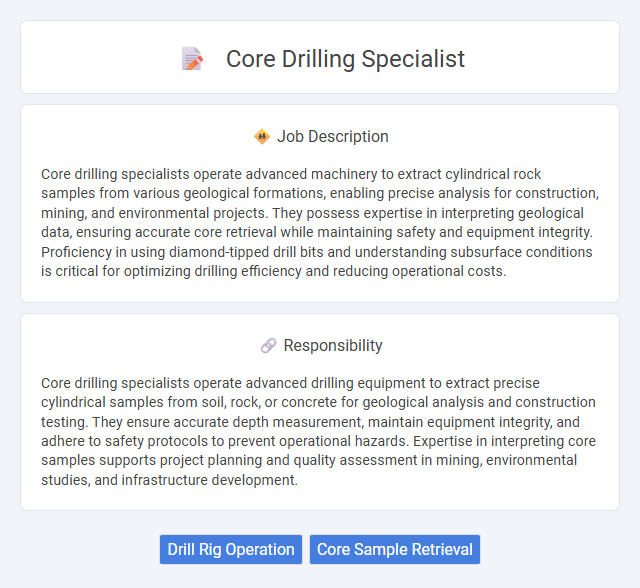
Core drilling specialists operate advanced machinery to extract cylindrical rock samples from various geological formations, enabling precise analysis for construction, mining, and environmental projects. They possess expertise in interpreting geological data, ensuring accurate core retrieval while maintaining safety and equipment integrity. Proficiency in using diamond-tipped drill bits and understanding subsurface conditions is critical for optimizing drilling efficiency and reducing operational costs.
Core drilling specialists are likely to be physically fit individuals who can handle strenuous tasks and work in challenging environments such as construction sites or mining areas. Those with good hand-eye coordination, attention to detail, and the ability to operate heavy machinery safely may find this job suitable. People who prefer routine, low-risk work or have limited physical endurance might struggle to adapt to the demanding conditions of core drilling.
Qualification
Core drilling specialists require extensive knowledge in geology and construction, often holding certifications in diamond core drilling techniques and equipment operation. Proficiency in interpreting geological data, coupled with safety training such as OSHA compliance, is essential for effective site evaluation and sample extraction. Experience in handling advanced drilling machinery and a strong understanding of subsurface conditions are critical qualifications that enhance accuracy and efficiency.
Responsibility
Core drilling specialists operate advanced drilling equipment to extract precise cylindrical samples from soil, rock, or concrete for geological analysis and construction testing. They ensure accurate depth measurement, maintain equipment integrity, and adhere to safety protocols to prevent operational hazards. Expertise in interpreting core samples supports project planning and quality assessment in mining, environmental studies, and infrastructure development.
Benefit
Core drilling specialists likely enjoy competitive salaries due to the technical expertise required in operating specialized machinery for precise drilling. They probably benefit from opportunities for career advancement within construction, mining, and geological survey industries. Safety training and hands-on experience in varied environments might also contribute to professional development and job security.
Challenge
Core drilling specialists likely face complex challenges related to precision and safety when extracting cylindrical samples from various materials. They probably need to manage unpredictable site conditions, equipment malfunctions, and strict regulatory standards. Success in this role may depend on their ability to adapt techniques swiftly while maintaining accuracy and minimizing risks.
Career Advancement
Core drilling specialists possess expertise in extracting precise geological samples critical for construction and mineral exploration projects. Advancing in this field often involves gaining certifications in advanced drilling technologies and safety protocols, leading to supervisory or project management roles. Mastery of data analysis and interpretation further enhances opportunities for career growth within engineering firms and environmental consulting agencies.
Key Terms
Drill Rig Operation
Core drilling specialists excel in drill rig operation by expertly handling advanced equipment to extract precise cylindrical samples from geological formations. Their expertise ensures accurate data collection for mineral exploration, construction, and environmental analysis. Proficiency in maintaining drill rigs, optimizing drilling parameters, and adhering to safety protocols is critical to maximizing operational efficiency and core recovery quality.
Core Sample Retrieval
Core drilling specialists excel in precision core sample retrieval, essential for geological exploration and construction projects. They deploy advanced drilling equipment to extract intact cylindrical rock samples, ensuring accurate subsurface analysis. Expertise in maintaining core integrity and minimizing sample contamination is critical for reliable data in mineral exploration and environmental assessments.
 kuljobs.com
kuljobs.com